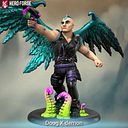Member-only story

I’m an adult man and She-Ra and the Princesses of Power has been one of my favourite shows on Netflix over the last 2 years. I usually pair this with GLOW as my second favourite, and I think what the shows have in common is a moral complexity and ambiguity. Naturally of course, spoiler warnings.
Marc Maron and Alison Brie portray complex characters right from the beginning with actions that both endear themselves to and alienate themselves from the audience. But that is adult television and She-Ra the reimagining is meant for kids, right?
But what age is it more important to learn the ambiguity of good and bad, and how it is a struggle to be good in a complex world. She-Ra understands this and I think that was as much it’s intent as it was to diversify the appearance of the characters so more children (and teenagers and adults) could see themselves represented on screen.
The original show, partly to meet the needs of the toy companies, had characters so similar that only the headgear and hair color really set them apart. And characters were neatly divided on the side of good or evil. The updated Netflix show, things are more like real life where good and bad are not nearly so easily categorized.
Through the first four seasons there are at least two notable migrations. Scorpia, the big bruiser princess with somewhat unwieldy pincers for hands clearly has a heart. She doesn’t want to hurt anyone, though she is at least cheerfully willing to when ordered. It’s clear that her motivation is a giant crush on Catra, the sometimes primary antagonist, sometimes secondary or tertiary. Sadly her feelings aren’t returned, nor is Catra even considerate of her as a friend, give or take a few acts of kindnesses along the way. You can feel the broken heart of someone pushed too far in Scorpia’s parting words to Catra “You’re a bad friend.” There are few lines in any T.V. program or movie that have resonated with me that much. Scorpia is eventually welcomed into the side of the princesses.
Redemption arcs are relatively common, if not often done well. Entrapta is the princess who makes the opposite journey. She is consistently portrayed as caring more about machines than people. It seems clear that this is at least a metaphor for the Autism scale if not a direct representation of Asperger’s…
